2024: Parliament's Year In Words
2024 saw the first Labour government come into power in 14 years (Alamy)
11 min read
After a historic year in UK politics, what can the language used in Parliament tell us about 2024's key themes, top moments, and power players?
From internet slang to political slogans, PoliticsHome takes a look at how politicians' most popular phrases have reflected a big year of change.
Making their parliamentary debut
A few words and phrases got their first-ever mention in the Parliament this year.
‘Nepo baby’ = a slang term that refers to someone who has achieved success or opportunities in their career through familial connections
New Conservative MP Peter Fortune had the fortune of mentioning this term for the first time in Parliament in his maiden speech on 11 September, while boasting that Bromley and Biggin Hill invented the modern income tax to raise revenue to fight the French.
Explaining that the tax was introduced by former UK prime minister William Pitt the Younger, who was assisted into his political position by his father, William Pitt the Elder, Fortune referred to Pitt as the “original political nepo-baby”.
Former deputy prime minister Oliver Dowden also mentioned the phrase on 15 October when he criticised the Labour Government’s plans to abolish hereditary peers.
-resized.jpg) Cabinet Office minister Georgia Gould has been accused of being a 'nepo-baby' (Alamy)
Cabinet Office minister Georgia Gould has been accused of being a 'nepo-baby' (Alamy)
“Today’s Labour party reeks of the hereditary principle – the elevation of the nepo-babies of north London, the coronation of the red princes: the Goulds, the Falconers, the Kinnocks, the Benns, the Eagles, the Reeves,” he said.
“Many of them are distinguished Members, but under Labour’s closed shop, it is hereditary peers out and hereditary MPs in.”
‘Delulu’ = internet slang term that's an abbreviation of the word ‘delusional’
New Labour MP Amanda Martin introduced this new term to the parliamentary lexicon on 5 November, accusing the Conservatives of being “delulu” in a post-Budget debate.
She claimed that Tory MPs were trying to “paint a picture showing that the last 14 years of Tory neglect were not a choice”.
“That is made even more delulu by attacks on the changes that this Government has made to fix the foundations and improve the lives of people in constituencies up and down the country.”
Shein = global online retailer founded in China that sells affordable clothing and other items
Some words have been used in Parliament for the first time this year for all the wrong reasons. Fast-fashion brand Shein has been mentioned six times this year, with politicians accusing the company of various transgressions such as flooding Asia, Europe and America with low-value goods, ripping off the work of British artists and sourcing labour from the Uyghur region of China.
Words in vogue
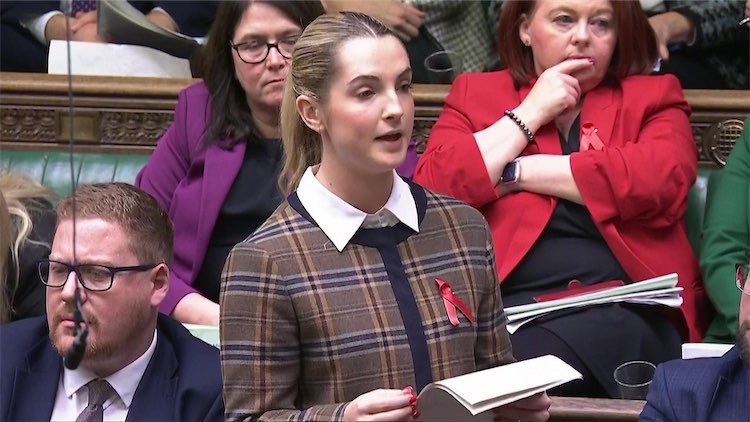 Rosie Wrighting, the new youngest woman MP, mentioned 'Gen Z' in her maiden speech (Alamy)
Rosie Wrighting, the new youngest woman MP, mentioned 'Gen Z' in her maiden speech (Alamy)
‘Generation Z’/‘Gen Z’ = generation born in the late 1990s or the early 21st century, perceived as being familiar with the use of digital technology and social media
Gen Z was first mentioned in 2018, but as this generation has become adults – and even MPs themselves – the use of the term in Parliament is on the rise.
It was mentioned a record 10 times in Parliament this year, in debates on recruiting young people into the armed forces, the impact of mobile phones and social media on their mental health and the younger generation's lack of trust in mainstream politics and news.
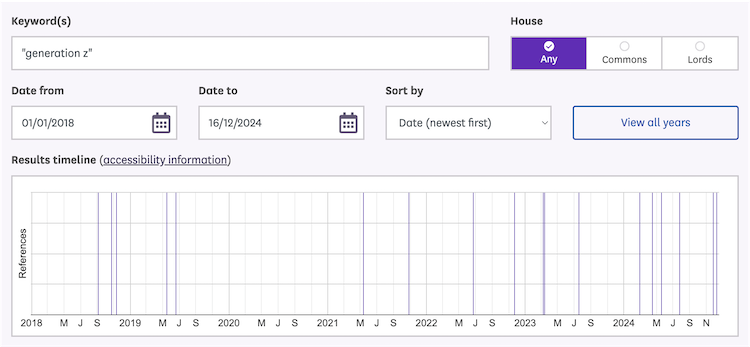 'Generation Z' or 'Gen Z' was mentioned 10 times in Parliament this year (Hansard)
'Generation Z' or 'Gen Z' was mentioned 10 times in Parliament this year (Hansard)
New Labour MP Rosie Wrighting – who is 27 years old and the youngest female MP – referred to her own Gen Z identity in her maiden speech.
“Under the last government, my generation faced significant hardships,” she said.
“There is a lot of talk about Gen Z, but many in my generation have had challenging experiences, such as education being moved to our living rooms; growing up on social media and experiencing the dark place that it can be, especially during the campaign; fear of a climate crisis in our lifetime; renting in insecure housing, with the idea of home ownership only a distant dream; and trying to build a career in the midst of a cost of living crisis. It is this that has led to my generation’s trust in politicians being so low.”
‘Union paymasters’ = suggestion that someone is under the control of trade unions paying for something to happen
This insult against Labour has been a favourite of the Conservatives for some time. It was first used in Parliament all the way back in 1971, but has recently risen exponentially in popularity and was used a record 39 times just this year.
Its use spiked on 10 September when it was used 11 times by Tory and Reform MPs in a debate on the announcement that the winter fuel allowance for pensioners would be means tested.
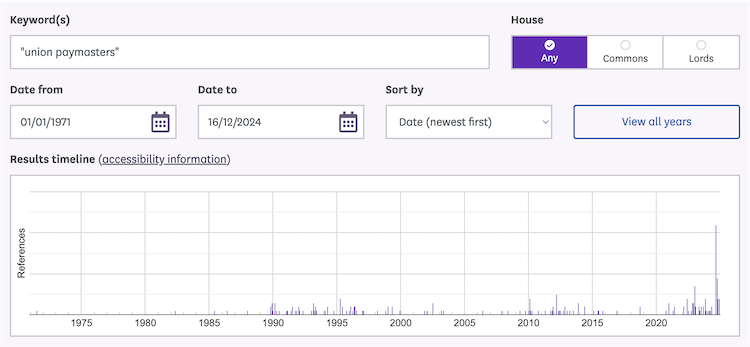 'Union paymasters' remains a firm favourite on the opposition benches (Hansard)
'Union paymasters' remains a firm favourite on the opposition benches (Hansard)
Former home secretary Priti Patel said taking away the allowance from some pensioners was an “ideological decision”: “A betrayal by Labour as it succumbs to shovelling gross amounts of public spending into the pockets of many of its union paymasters.”
Reform UK = right-wing political party, originally created in 2018 as the Brexit Party
Reform was only mentioned in Parliament for the first time by Lord Wallace on 21 December 2022, two years after it was renamed from the Brexit Party. It went on to be mentioned only twice in the whole of 2023.
But in 2024, with the collapse of the Conservative Party’s public support and the return of Nigel Farage as leader, the party managed to gain five Reform MPs at the General Election and was referenced 11 times in Parliament this year.
The party is regarded as a threat by both the Conservatives and Labour, with a caucus of 'Red Wall' Labour MPs set up after the election to fight the rise of Reform in their constituencies.
Green Party = green, left-wing political party
Some of the other smaller parties have also seen an uptick in parliamentary attention.
Mentions of the Green Party have been rising steadily over the decades, reaching a record 103 mentions this year, along with their record number of four MPs elected in the General Election. Notably, they have significantly more mentions than Reform, despite having one fewer MP – which can in part be explained by the frequent appearances of the two Green Party peers, Jenny Jones and Natalie Bennett, in the Lords chamber.
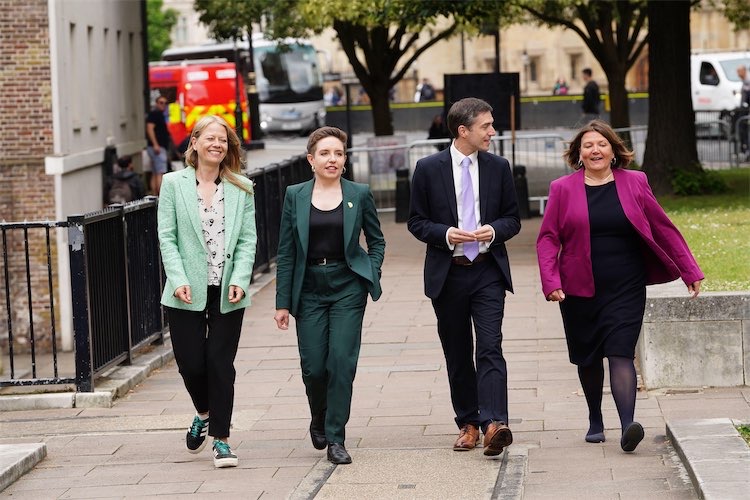 The Green Party increased their cohort of MPs from one to four in this year's General Election (Alamy)
The Green Party increased their cohort of MPs from one to four in this year's General Election (Alamy)
Liberal Democrats = liberal political party
The Lib Dems have not managed to accompany their record number of 72 MPs with a record number of mentions in the Commons and the Lords. But they are slowly climbing back up to the number of parliamentary mentions they enjoyed in the Tory-Lib Dem coalition years between 2010 and 2015.
‘YIMBY’ = acronym standing for ‘yes in my back yard’, signifying that someone is pro-housing and infrastructure development in their area
‘YIMBY’ was first mentioned in 1989 by Viscount Thurso in reference to radioactive waste: “Like the noble Lord, Lord Campbell of Croy, I am a ‘Yimby’ – yes, in my backyard – not a ‘Nimby’. If it is useful to the country and is desirable and sensible, you can bury the stuff in my lawn or in my backyard.”
In recent years, it has slightly gained popularity, and this year was mentioned a record four times – though mostly by MPs such as Housing Minister Matthew Pennycook who said they found the YIMBY versus NIMBY debate “incredibly reductive” when it came to debating housing policy.
So far, the Labour Government has largely taken a 'YIMBY' approach, shaking up planning rules to achieve its aim of building 1.5m homes by the end of the Parliament.
‘NIMBY’, the euphemism on the other side of the debate, remains a steadily popular phrase – but peaked with 28 mentions in Parliament back in 2011, (with 27 mentions this year).
‘Two-tier policing’ = phrase used to describe the impression that some protests and demonstrations are dealt with more harshly than others
This is another phrase which is far from new to Parliament, but has had somewhat of an uptick this year. It was first mentioned in 1981 during a debate on the Scarman report, which was commissioned by the government following the 1981 Brixton riots. The debate involved discussion on whether the police were institutionally racist in both the lead-up and response to the riots.
The phrase was also referenced in discussions on policing in Northern Ireland in the 1990s and 2000s.
However, this year, ‘two-tier policing’ was mentioned in Parliament a record 10 times. Many MPs and ministers denied its existence while others claimed 'two-tier policing' has prevented police from taking action on Gaza protesters and Just Stop Oil activists.
American billionaire Elon Musk weighed into the debate on 'two-tier policing' by calling the UK Prime Minister 'two-tier Keir', prompting concerns that the X owner was fuelling conspiracy theories and trying to sow division in the UK.
Following the riots which spread across the country after the Southport stabbings, Reform leader Farage asked at Prime Minister’s Questions on 11 September: “Does the Prime Minister understand that there is a growing feeling of anger in this country that we are living through two-tier policing and a two-tier justice system?”
‘Black hole’ = Labour Chancellor Rachel Reeves’ claim that the Conservatives left a “£22 billion black hole” in the public finances
This ‘black hole’ was mentioned 460 times this year alone, with a particular uptick around the time of Reeves’ first Autumn Budget. It has formed a major part of the Labour Government’s early narrative around its economic plans and the inheritance it was left by the Tories, and has been used to justify “tough choices” such as means testing winter fuel allowance payments and increasing National Insurance for employers.
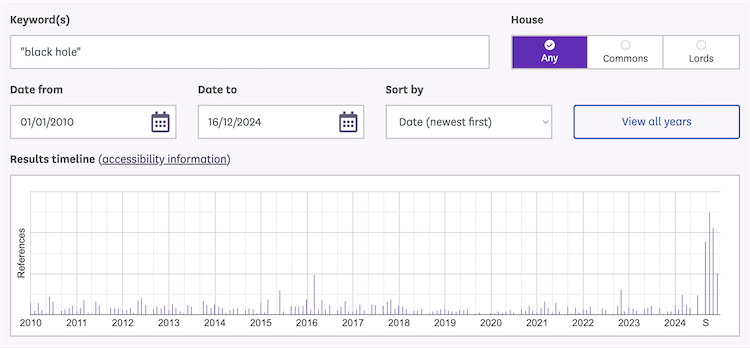 'Black hole' has formed an important part of the Labour Government's economic narrative (Hansard)
'Black hole' has formed an important part of the Labour Government's economic narrative (Hansard)
While a Treasury audit did forecast a £22bn overspend in departmental day-to-day spending this year, various organisations, including the Institute for Fiscal Studies think tank, have disputed whether this could have been anticipated before Labour entered office.
Struggling to catch on
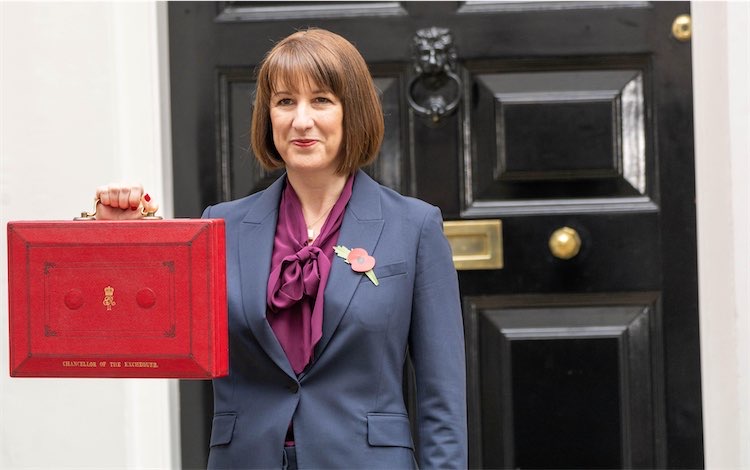 Chancellor Rachel Reeves delivered the first ever Budget by a female chancellor and the first Labour budget in 14 years (Alamy)
Chancellor Rachel Reeves delivered the first ever Budget by a female chancellor and the first Labour budget in 14 years (Alamy)
Securonomics = economic approach focusing on the economic security and resilience of a nation and its people
Reeves introduced this concept in a speech at the Peterson Institute for International Economics in May 2023, inspired by outgoing US president Joe Biden’s ‘Bidenomics’.
‘Securonomics’ was first mentioned in the Lords last year, but has not been taken up by Labour MPs. It has been mentioned only twice in Parliament this year: once in the Lords and once in the Commons by then-Leader of the Commons Penny Mordaunt on 18 April: “They [the public] might be tempted by the sound of “securonomics”, only to discover that that is built on unfunded pledges and unspecified tax increases.”
On the decline
Some of the previous Conservative government’s former favourite buzzwords have – unsurprisingly – seen a decline in use in Parliament this year.
‘Stop the boats’ = one of former prime minister Rishi Sunak’s five government pledges in 2023
The pledge to ‘stop the boats’ crossing the Channel illegally was mentioned a whopping 295 times in 2023, but has fallen to 117 this year. Originally intended to be a measure for the public to judge the government’s progress on tackling illegal migration, ‘stop the boats’ became a rod for the Tory government’s own back.
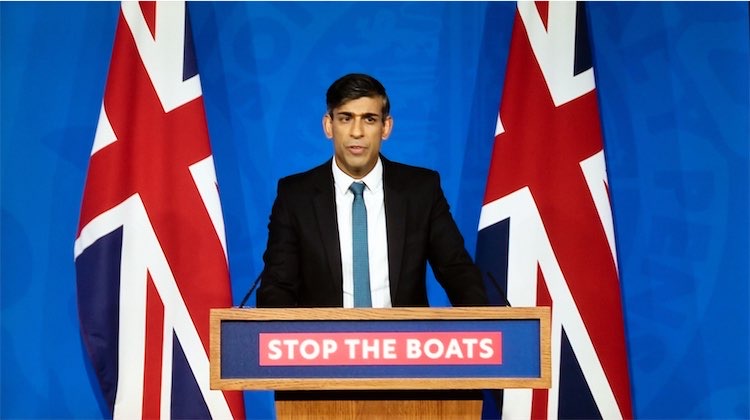 The Conservative government did not achieve its pledge to 'stop the boats' (Alamy)
The Conservative government did not achieve its pledge to 'stop the boats' (Alamy)
‘Lefty lawyers’ = derogatory phrase used against human rights lawyers
This phrase was mentioned 14 times in 2023, usually in debates on the Illegal Migration Bill, as a term for the human rights lawyers blocking the deportation of migrants to Rwanda. However, it was mentioned only six times this year and only once since the General Election, by Reform UK MP Lee Anderson.
“We see the non-governmental organisations, the lefty lawyers and the Labour party together encouraging these illegal migrants to come over the channel by using the same old slogan: ‘smash the gangs’,” he said.
The Labour Government’s ‘smash the gangs’ slogan has not yet achieved the same salience as ‘stop the boats’, having been mentioned 21 times in Parliament this year.
Swear words
Hansard shows that the use of swear words in Parliament, including ‘fuck’, ‘shit’, and ‘crap’ has broadly gone down this year, with most examples of curse words decreasing in frequency between 2023 and 2024. There are markedly fewer swear words used in both chambers now compared to the years when Brexit negotiations dominated Parliament.
PoliticsHome does not want to be overly optimistic – but could this be a sign that the era of toxic parliamentary debate could be coming to an end?
